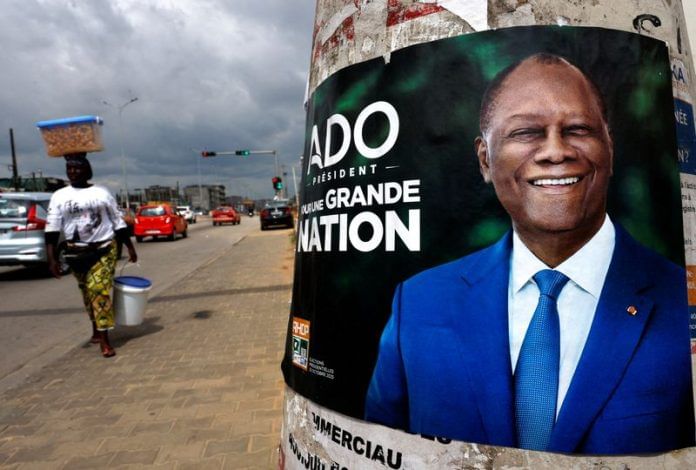By Duncan Miriri
NAIROBI (Reuters) -Ivory Coast, the world’s top cocoa producer, will vote in a presidential election on October 25 with incumbent Alassane Ouattara widely expected to secure a fourth term.
Here are the main issues investors are watching.
WHO IS RUNNING?
Ouattara is facing off against four candidates: two former government ministers, a former spokesperson for Ouattara’s predecessor, Laurent Gbagbo, as well as Gbagbo’s ex-wife, former first lady Simone Gbagbo.
None have the backing of a major political party, however, so the race has been more notable for who has been excluded: Laurent Gbagbo as well as Tidjane Thiam, a former Credit Suisse CEO.
A court ruled Thiam held French nationality when he registered, which Ivorian law does not allow.
That leaves Ouattara, a U.S.-trained economist who previously worked at the regional central bank and the International Monetary Fund, heavily favoured to win in the first round.
Announcing his candidacy in July, the 83-year-old brushed off concerns over his age and health, saying Ivory Coast needed experience in the face of “security, economic and monetary challenges.”
WHY DO INVESTORS CARE ABOUT IVORY COAST?
Ivory Coast is among the fastest growing economies in the region. Its international bonds are some of the best performing in Africa, attracting investors who do not traditionally put their money into frontier debt, market participants say.
The government has built on that success by diversifying into new markets and debt instruments.
Those include a debt-for-education swap last December, a regional currency denominated international bond in March, and an ESG-certified Japanese samurai bond in July. It also secured Africa’s first ever sustainability-linked loan last month.
Investors, however, are watching the election closely to assess Ivory Coast’s democratic credentials.
IS ELECTION-RELATED VIOLENCE A RISK?
Ivory Coast has a history of fraught polls.
The 2010 election that brought Ouattara to power triggered a brief civil war that killed 3,000 people, after Laurent Gbagbo refused to accept defeat.
Some 85 people died in clashes surrounding the 2020 vote, which the opposition boycotted over Ouattara’s decision to run for a third term despite a constitutional two-term limit.
Thiam has dismissed the upcoming election as a “coronation” of Ouattara, calling the exclusion of opposition figures an “abandonment of democracy.”
While seasoned investors in African assets may have the experience to ride out election-related turbulence, those who have only recently dipped their toes into Ivorian assets could feel uneasy if violence breaks out, market participants said.
Any unrest, however, is unlikely to spill out of control, they said.
WHAT ECONOMIC CHALLENGES WILL THE WINNER FACE?
Cocoa is the lifeblood of the Ivorian economy, but West African cocoa production is declining. Whoever wins the election will need to tackle the issues behind the drop: shifting weather patterns, ageing tree stocks, disease and destructive small-scale gold mining.
Ivory Coast has a plan to combat the impact of climate change on its economy, but it is unclear how implementation will progress in the face of dwindling climate financing for Africa.
The cocoa sector could also come under pressure from the European Union’s landmark anti-deforestation law, which has not yet taken effect but would require EU importers to prove their products did not cause deforestation.
And the economy could take a hit should Ivory Coast face greater threats from Islamist militant groups active elsewhere in West Africa, notably Mali, Burkina Faso and Niger.
(Reporting by Duncan Miriri; Additional reporting by Karin Strohecker and Maxwell Akalaare-Adombila; Editing by Robbie Corey-Boulet and Joe Bavier)
Disclaimer: This report is auto generated from the Reuters news service. ThePrint holds no responsibility for its content.






